|
PORTLAND TO BOOTHBAY
photo galleries

Today we were heading North
and crossing over the imaginary line of Southern Maine to Mid-coast Maine.
It’s mid August now and the weather forecast is for 10-20 knots winds, 2-4
foot seas coming from the S or SW with 1-3 mile visibility. Chance of
scattered thunder showers are expected for this afternoon. This is the
first time cruising these waters and it will be interesting to see how the
weather report reflects the actual conditions. When we cruised Alaska,
the reports covered such a wide area that you really were on your own trying
to figure out what the weather would be in your particular cruising area.
We’ll see how it is here.
The coast of Maine has been
divided in three sections by the books we’ve been reading. They are each
described as being very different from each other in physical, historical and
social aspects. Mid-coast Maine is said to stretch from just north of
Portland (where we are) to the “western shores of Penobscot Bay”. This
includes the wonderful island of Monhegan, and the Boothbay region, Pemaquick,
Rockland, Camden and Belfast. They say there are no more sandy beaches
as the coastline rapidly becomes ragged and rocky, filled with islands and
long finger peninsulas. The European history here is fascinating and we
are constantly reminded that it goes back well beyond the first arrivals of
the Pilgrims who first set foot on the shores of Massachusetts. The
fearless fishermen who set up early fishing camps are the real early settlers
according to the Mainers. They established camps in the remotest of
places along the coast of Maine, places such as island of Monhegan and
Damariscove Island, to mention a few that we will pass by as we head north.
LEAVING THE DOCK
Larry encouraged me to take
Knotty Dog out of the marina today. I didn’t feel very confident as the
opening out I had to go through heading out into the harbor between two docked
boats was very narrow and I wasn’t sure I had the experience to judge the
space. I visibly wasn’t sure if the width of the boat would clear it
though I knew it did because Larry brought her in here. I would have to
make a critical turn part way through the narrow area to miss another boat
just ahead and wasn’t sure if I understood the timing to do it without
scraping the back part of the boat on another boat behind. We didn’t
have any turning room either where we were docked to get her into position
before I headed towards the opening. Larry convinced me I could do it
but I made him stand by me all the way.
I took her gently off the
dock with the bow thrusters and began a small turn with the bow. We have
a swim step in the back of the boat that we added when we bought the boat.
It adds 3 extra feet to the length and is sometimes deceptive and throws you
off. You think you have enough room to clear but then have to remember
there’s that extra three feet. Larry said to give the stern thruster
more thrust, so obviously I was a little tight to the dock. I pushed the
throttle on the stern thruster and then put her lightly into forward gear
thinking the slower and more careful I went, the better I will be able to
maneuver. Larry came up and said give her more speed, so I guess it
needed more speed or power to give her more control.
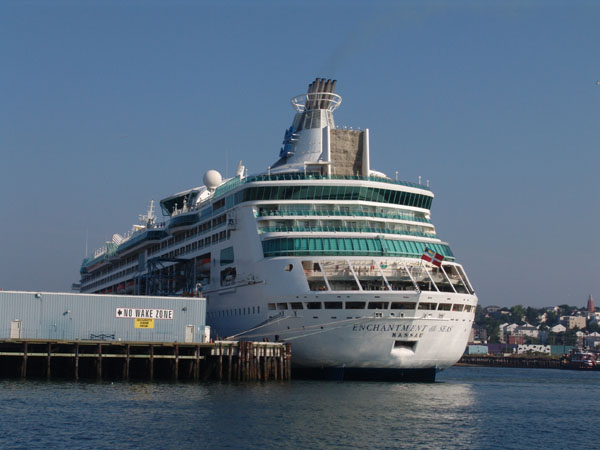 There’s
always a current running in Maine unless you’re lucky enough to hit everything
at slack tide. He said I was doing “just fine, keep going” and as we
started to go out between the two boats on either side, I didn’t pay much
attention to the small nearby dory to our port but carefully watched
the bow of the large trawler pointing precariously in our face on the
starboard side. It was a very tight squeeze and Larry quickly reached
over and gave the bow thrusters a quick blast giving us more space between us
and that boat’s bow. And soon, like a flash, we were spit out into the
harbor. It was just that easy, taking no time at all. I spent all
that time spent worrying about it when it was over in a flash not without
Larry’s help. There’s
always a current running in Maine unless you’re lucky enough to hit everything
at slack tide. He said I was doing “just fine, keep going” and as we
started to go out between the two boats on either side, I didn’t pay much
attention to the small nearby dory to our port but carefully watched
the bow of the large trawler pointing precariously in our face on the
starboard side. It was a very tight squeeze and Larry quickly reached
over and gave the bow thrusters a quick blast giving us more space between us
and that boat’s bow. And soon, like a flash, we were spit out into the
harbor. It was just that easy, taking no time at all. I spent all
that time spent worrying about it when it was over in a flash not without
Larry’s help.
The morning sun was in our
face and suddenly after the tense few moments of wondering if I (we) could get
her out of that dock space, now we’re in the main shipping channel of
Portland. I remember from our Trolley Tour yesterday that Portland
Harbor is the Northern most ice free port on the East Coast. Canada
depends on it as it brings all their oil in through this port. The oil
is taken off the ships and is piped across Maine to the Canadian border.
To my left was a huge cruise
ship that must have come in last night. Now, that explains the large
swells we felt at the dock last night. Several lobster boats were
heading out to sea and I just followed in behind. Larry brought the
fenders in and then took the wheel as I tied and stowed the lines off the
rails ready for our next port.
We’re now passing the old
fort on our portside today and admire the beautiful homes on our starboard
that lead out past Portland Lighthouse that we visited by trolley the day
before. I can see why the trolley guide said it was the
most photographed light house. It is truly a pleasant sight.
HEADING OUT TO CASCO BAY
Guests have left and we’re on
our own again. They came in a burst and now we’re suddenly by ourselves.
Now I can think. We love to have guests but it thoroughly throws me off
my regular routine. I really don’t pay attention to the surroundings
when guests are aboard as we’re laughing and talking. I’m also thinking
about what and where we are going, trying to make sure they will like where we
take them are enjoying themselves. Sometimes it’s very difficult to know
where to take friends that come to visit because we don’t know the ports and
anchorages. Every place is new and unpredictable but we have had such
great people for guests that always go with the flow. That’s what makes
them special, as they can enjoy their environment no matter where they are.
MISTAKE OF READING TOO
MUCH
Today we are just free to sit
back and not carry on a conversation or worry about what we’re eating next, so
that in itself is relaxing. I made one mistake though before we left and
that the mistake of reading too much. I just started The Edge of
Maine, by Geoffrey Wolff, and love it but I realize now, he’s
definitely made an impression on me. I’ve became so engulfed in all his
woes of cruising and getting lost among the fog and going aground on rocks and
all his stories of people getting in trouble cruising in these waters that
I’ve definitely got an edgy stomach going out this morning.
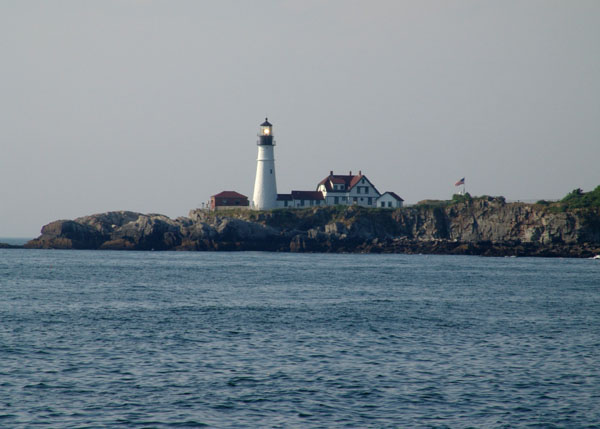 As
we head out between Portland Head Lighthouse and Ram Island Light on our port
side, the seas suddenly get mixed. No more protected calm waters of the
Portland Harbor. The 4 foot swells are definitely out here today and
they are close together making for a bit of rocking and rolling as they are
coming at us right on our beam. As
we head out between Portland Head Lighthouse and Ram Island Light on our port
side, the seas suddenly get mixed. No more protected calm waters of the
Portland Harbor. The 4 foot swells are definitely out here today and
they are close together making for a bit of rocking and rolling as they are
coming at us right on our beam.
EDGY from THE EDGE
OF MAINE
Larry’s tracking our course
out past the lighthouse taking us towards Witch Rock. I glance over at
the electronic charts and can’t read clearly how deep it is. Our course
looks like we are going to cross over an area that shows only 2 feet below us.
I check the paper charts which are easier to read and it says 23’. I
guess I’m a bit edgy from reading The Edge of Maine and all its mention
of people getting stuck on hidden ledges. He described cruising in Maine….
“Holding a precise course across the Gulf of Maine was no petty imperative.
The currents swirl erratically and given poor visibility an on-the-button
landfall would be a matter of blind hazard.” “It’s (Maine’s) chief
topographical attraction—rock-strewn coasts and myriad islands----makes close
to shore sailing a grim option. Sailing Down East once upon a time
separated lambs from wolves.” Given the fact that we aren’t sailing,
we’re power boating, and the other fact that we have state of the art
electronics on board, still didn’t soften the “edge” I was feeling today after
reading his book the night before. 90% of the time, I’m much better
off, not reading a thing about cruising waters until I’m about a hundreds
miles from the spot I’m reading about. Reading these descriptions of woe
and danger do something to my imagination, all sensibility goes to the wind.
FOG
His descriptions of sailing
in the fog too, gave me a fearful apprehension of any weather predictions with
fog now, even though we’ve cruised in pea soup, monitoring radar screens with
no problem. He would describe woeful currents dragging boaters
precariously close to rocky submerged shallow ledges. He would quote
other cruising books, warning that to sail in the fog (in Maine) is a
misguided adventure and “you might as well have your head in a bag”. Why
were these waters all of a sudden different from other areas we’ve cruised?
He describes currents swirling, and pulling you left and right, “fog factories
of the Bay of Fundy and the Labrador Current, more common than sunshine.”
Now if I heard that there was any inkling of forecast of fog I was worried.
Reading about a broadcast put out through the Canadian Broadcasting
Corporation didn’t help either, saying that “Fog Kills Songbirds in Bay of
Fundy!” “Fishermen tell of sea birds falling onto their decks from the
sky; the birds---lost in the fog---become wet and heavy, too cold and
miserable to fly.” I had heard warnings of married couples
cruising in Maine who get socked in to remote anchorages for weeks with fog.
It was so tough on the marriage relationship that some never survive and end
of selling the boat and getting divorced. Some say that “fog can keep
you anchored so long in one place that you’d ground on your own beer cans
before you’d dare move.”
Geoffrey Wolff quotes another
misadventure, “Roger Duncan has described sailing in a Penobscot Bay fog so
thick that the Vinalhaven ferry coming in from Rockland with radar couldn’t
find her slip.” “Even the birds be walkin” it’s so thick. I hope we
don’t have this to look forward too as we head north. Fortunately today,
no fog was predicted.
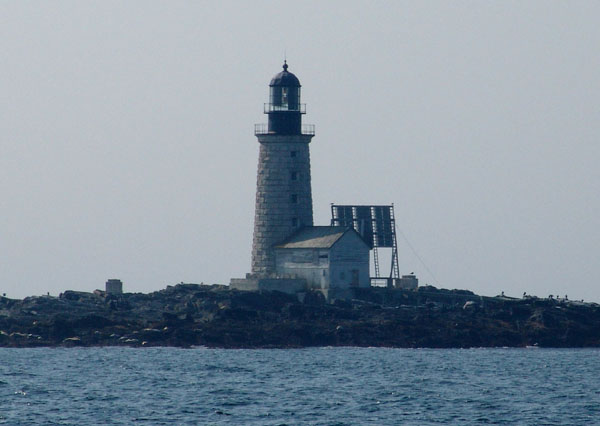 LONELY
OUT HERE LONELY
OUT HERE
We’re going the same route
now that we did when we left Kennebunkport to Jewell Island but the seas are
not the same. The four foot waves are rolling in series towards us.
We see the cluster of islands at the southern tip of Jewell Island.
The first group of islands is called Junk of Pork. I have no idea why
they called them Junk of Pork but it gave us a chuckle. We passed Jewell
Island where we anchored on the protected NW side over a week ago. It
was a beautiful little anchorage and I regret that we didn’t explore the
island more by hiking to the old army lookout but at the time the bugs were
out in full force.
We passed Half Way Light.
I’m reading that all the lighthouses were built after ship wrecks and deaths.
Mmm nice. This one was built in 1871 and had a light keeper who would row
the 11 miles from Portland and back for supplies. To me that seems an
impossible task. Larry says that he thinks Half Way Light marks the half
way distance to something but we couldn’t figure out what. It was lonely
out here, nothing out here except for a few scattered lobster pots. We saw
three huge yachts, one going north (or Down East as they say) but looking like
he’s headed straight out to sea, another going south, and one crossing in
behind us, probably heading toward South Freeport. I’m not really
enjoying looking out the window today as the swells are huge. They are
as tall as the pilot house and are starting to have white caps. The sea
feels so different up here. The temperature off the water is cold and
the swells and waves feel strong against the boat. They look very
determined. The rocky ledges of the islands are beautiful but a warning
to keep alert.
We pass Eagle Island on our
left, too far to photograph, but I can make out Admiral Peary’s house on this
remote isolated Island. Anyone who would choose to live on such a remote
island with such difficult seas and weather surely is of the stuff to discover
the North Pole.
We pass the markers
identifying Drunkers Ledge and Eastern Drunkers Ledge and we can only imagine
how they got their names. We are off shore quite a ways now taking a
more direct route to Boothbay. It’s a feeling of comfort to be away from
the rocky shores and hidden ledges but we have no rest even out here as we are
still constantly dialing the auto pilot to avoid the lobster pots. The
huge swells just outside the pilot house are still slowly but steadily rolling
towards us.
Off to our portside is Ragged
Island where the author of another book I’m reading got stuck in bad fog.
It looks so harmless today but as I look in the binoculars, it’s lonely with
only a desolate looking wooden structure. Next to Ragged Island is White
Bull Island which is the whitest island around, not a tree, grass or bush,
just white rock. Then just beyond is Mark Island where every square foot
is covered with trees and shrubs. Go figure why one is bare and another
covered in foliage and then still another completely different just covered in
brown earth and called Brown Cow. It’s like White Bull Island, treeless,
grassless, and shrub less but instead of being white, it’s of course brown and
rocky.
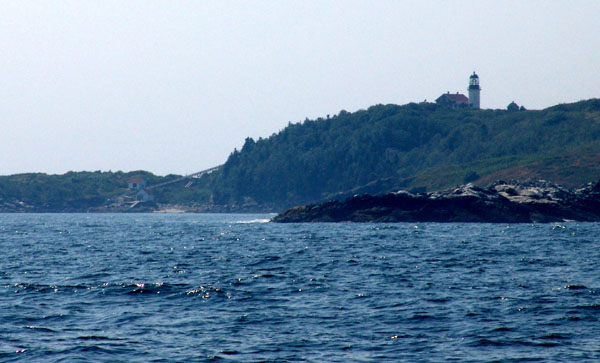 “PLACE
WHERE THE SEA VOMITS” “PLACE
WHERE THE SEA VOMITS”
What the heck? Yes, that’s
what they say. The name Sequin Island translates to “where the sea
vomits”. We are experiencing unruly seas today but no vomiting. If
this is any description of what the seas are like around this high mounded
island on a bad day, I don’t want to get near it.
The Sequin Island Light is
perched on top of the high crested island on a grassy knoll. It looks
pleasant and picturesque. The light is clear and flashing and has been a
welcoming sight to many a weary mariner. Today the shores though have no
calm place, nor what we could see as a safe landing for the light keeper of
days past. There are a few buildings scattered on the north side of the
island where boaters can pick up a mooring or two when the weather is settled.
There is a large ramp from that point that heads up the steep hill to the
lighthouse.
A MADMAN RESIDED HERE
Sequin Island is beautiful
from the distance as the lighthouse is perched on top of this green mound of
an island. It’s hard to imagine looking at the beauty of it, that a
story is told, as there are of many lighthouses, of ghosts and strange tales
and this place has one that could top them all. During the 19th
century one of the lighthouse keeper’s wives had a piano. It is said
that she played the same tune over and over again until she finally drove him
mad and he chopped the piano into pieces with an ax, killed his wife and
finally himself. Of course some say on still nights they swear they can
still hear her playing the song over and over.
As we pass the island we must
go by the Sequin Ledges. They are barely exposed rocky ledges.
They are covered with birds and seals sunning themselves. We have been
warned in the cruising guides that there is a magnetic disturbance at
Ellingwood Rock near the ledges but we can’t pick up any change. Once
past the Sequin Ledges the winds suddenly die down to 6 knots from 15+ knots.
The seas have calmed too. The tide is changing and starting to run in
our favor for our last leg of the journey today to Boothbay. The
seas have calmed down.
KENNEBEC RIVER
Sequin Island Light also
marks the outer reaches of the entrance to Kennebec River and Popham Beach.
At the Kennebec River entrance is another lighthouse marking the river’s
entrance. Popham is famous in the history books as the place where early
colonists made an earnest attempt to form a first colony here in 1606, but
“failed miserably” though they did manage to make the first sailing vessel in
New England called the Virginia to cruise and explore the surrounding
areas. History also left its mark on these shores some years later when
a fort was built to protect the upper reaches of the Kennebec River during the
Civil War. We could see its fortress like walls in the distance as we
cruised by.
The Kennebec River of course
is very famous for the many great ship builders that settled along this river.
Its deep waters were perfect for launching deep draft ships and the abundant
nearby pine forests, made perfect ship masts. So it made for a natural
place to design and build ships. Many famous ships have sailed to sea
from this river. Even today the area is world renown for building and
launching our country’s naval destroyers and other commercial vessels up the
river at Bath Iron Works.
As we cross over the entrance
to this famous river, on the northern shores we see many lovely cottages that
line the rocky precipices of the shoreline. They are surrounded by
beautiful thick forests.
We head across Sheepscot
Bay and weave our way past numerous rocky shoals. To our starboard
are the rocks called Sisters. On our left are The Black Rocks.
In between paying attention to all these scattered rocks, ledges, and the
lobster pots, we see ahead the start of the dreaded fog.
The temperatures are cooling and the air is damp and the land, rocks, and
surrounding boats are turning that whitish gray in the haze. Everything
is staring to blend together into one monotone shade of grey white. We
still have good viability but why did I read those darn cruising books.
Each author seems to revel in telling you misfortunate experiences, the
dangers of cruising this area, or the notorious bad squall. Sometimes
don't you wonder if they aren’t exaggerating just a little the danger of their
situation?
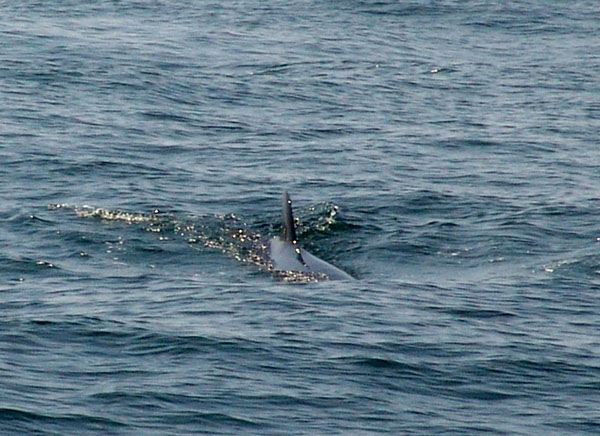 THAR’
SHE BLOWS! THAR’
SHE BLOWS!
It’s our first whale sighting
off The Black Rocks in Sheepscot Bay! Not a big one or a
very dramatic exiting. We only saw just the very tip of the dorsal fin
and back and a large blow. He or she is a small one, but nevertheless,
our first whale sighting on this trip!
DAMARISCOVE ISLAND
We cross Sheepscot Bay and
make our way around Cuckolds point. Off to our right is Damariscove
Island which was an established fishing camp long before the Pilgrims arrived
in Plymouth. Not much is written in the general history books but every
history book of Maine will remind you. Fishermen from the
continent of Europe fished these plentiful waters in the summer and dried
their catch on the shores of Damariscove Island long before any lands were
settled here. “It’s not surprising that we read little of this in
published accounts, for most of these men were illiterate; and furthermore, no
fisherman, having discovered a good place to fish, is eager to advertise it to
others.” Even the Pilgrims knew of it and in their year of distress,
1621, they sent Edward Winslow to Damariscove for help. Of the island,
Charles K. Bolton writes in The Real Founders of New England:
“It is not too much to affirm
that Damariscove was, from 1608, let us say, to 1625, the chief maritime port
of New England. Here was the rendezvous for English, French and Dutch
ships crossing the Atlantic, and for trade between Damariscove and New
Netherland as well as Virginia to the south. Here men bartered with one
another and with Indians, drank, gambled, quarreled, and sold indentured
servants.”
Wow, imagine that all before
the pilgrims arrived! Now it is an uninhabited island protected by the
Nature Conservancy who occupy and protect the island in the summer months.
Lucky dogs!
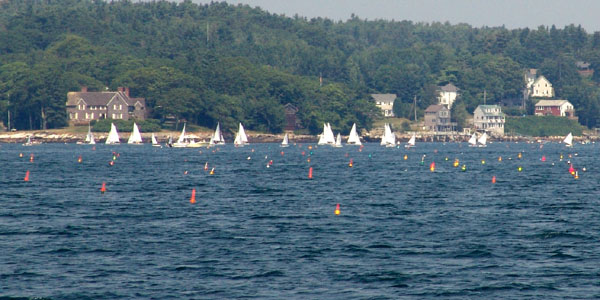 BOOTH
BAY BOOTH
BAY
Well, we missed the big fog
bank, leaving it out there somewhere off the shores of Damariscove Island.
It turned out to be a beautiful stretch of water heading up Booth Bay and into
Booth Bay Harbor. Beautiful islands surround us sprinkled with quaint
summer cottages. We again encounter the biggest lobster mine field yet.
We can see it in the distance and right in the center of it is the sailing
school with their little boats weaving back and forth through them like it was
nothing. We carefully head into the field of pots doing our best not to
cut any lobster lines but it is no easy task as they are everywhere and
closely packed.
As we get more inside the
harbor, it is crowded not only with lobster pots but moored boats. The
harbor is beautiful though with marina after marina and as many lobster
pounds. We hail our dock master on the radio as we near our destination
and are told there’s a boat still in our slip. They think the captain
and crew are having lunch somewhere and can we hang out in the harbor for a
bit while they try to find them? Hanging out in the harbor for a bit is
no easy task as there really isn’t a lot of room between the moored boats, the
lobster pots and the many excursion boats going in and out. We said fine
and did our best. It was after their check out time so why was the boat
still there? A bit inconsiderate with think.
The current is running a good
clip in the harbor which doesn’t make things easier as we’re trying our best
to stay in one small open spot that we found. We’re constantly checking
around us for lobster pots to stay away from them. Finally after a half
hour of this we call the dock master again and ask how it’s going. They
apologize profusely and say they found the captain and the boat should be
leaving shortly.
We are watching the dock
through our binoculars trying to see what’s going on. We think we see
the boat they are trying to get to leave. It’s a huge, probably 90 foot
blue hulled yacht and no one seems to be in a hurry to leave. The crew
is chatting on the dock and really taking their time. By now the harbor
master, in his small boat, has come by us a few times to see what we are
doing. He’s decided to hang off to the side. He’s keeping an eye
on us as we’re almost in the way of the traffic coming and going in the
harbor. We’re getting tired of manipulating the forward and reverse
gear and thrusters as we try to stay put in the current which is really
becoming a force to be reckoned with. Finally, we can see that the
captain has started his engines as a great puff of black smoke and then water
sputtering from his tail pipe. Still he sits and they chat on the dock,
well, but I’m sure he’s waiting for the engines to warm up. By now,
we’re getting a little miffed but are staying calm. It’s been about 45
minutes to an hour that we’ve been waiting for this character who is past his
check out time.
The crew finally gets the
order to begin to taking in the lines. Once all that is done and all the
crew is on the boat, he begins to back out very, very slowly. Instead of
backing down into the channel, pointing the boat out, so he can turn and come
forward towards us and out the harbor, he turns his stern towards us.
This is putting him into a precarious situation because he now has to do a
full 360 degree turn. If he had just backed out the other way it would
have been a simple 45 degree turn. You can see that he’s got himself
into trouble now. He is wallowing around, fighting the current, I think
and coming very close to boats that are moored next to him and well, forget
about the lobster pots, he has gone right over them Finally he reverses
his position, turns back, trying to go forward which is heading right into the
dock again. He is going really too slow for the current or something is
wrong. Now he finds himself being pushed up to the side of the dock and
having trouble. We can’t figure out what the heck this guy is doing and
begin to wonder if he had a few too many beers at “lunch”. Finally he
manages to get her off the dock and powers out. He comes out right by us
with not a glance or wave or even a sorry look for the inconvenience he caused
everyone. I’m sure he knew we had been wallowing around out in the
harbor for an hour now waiting for him but don’t think he cared.
We finally got the all clear
on the radio from the dock master and pulled in to the dock. The small
marina is run by an older woman and her gentleman husband. They both
were very nice people especially the woman who seems to do most of the work.
They apologized profusely about the captain who kept us waiting for an hour.
We just laughed it off and we all had a good time listening to her stories
about some of the crazy dockings they have experienced there.
We were glad to be here and
were right in the innermost location to Boothbay Harbor. We hooked up
the power, hosed the salt off Knotty Dog and headed up the dock to see the
town.
photo galleries

Back to TOP
        
|